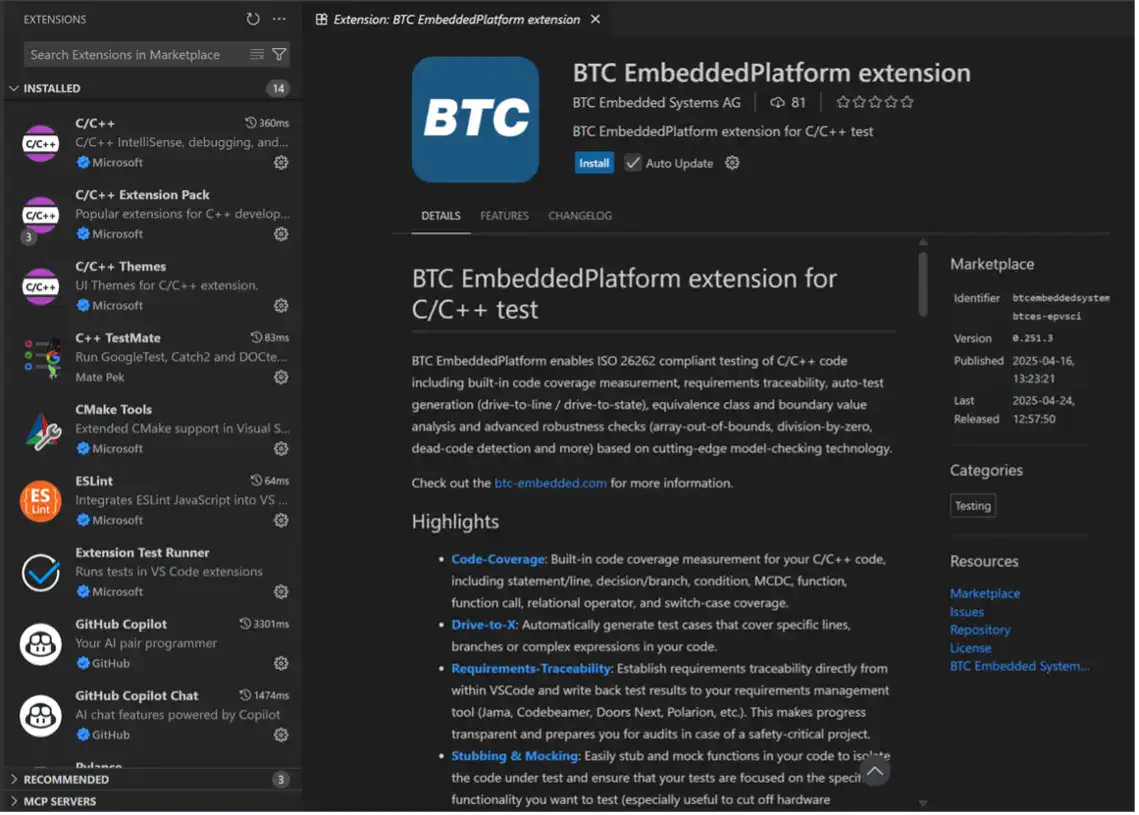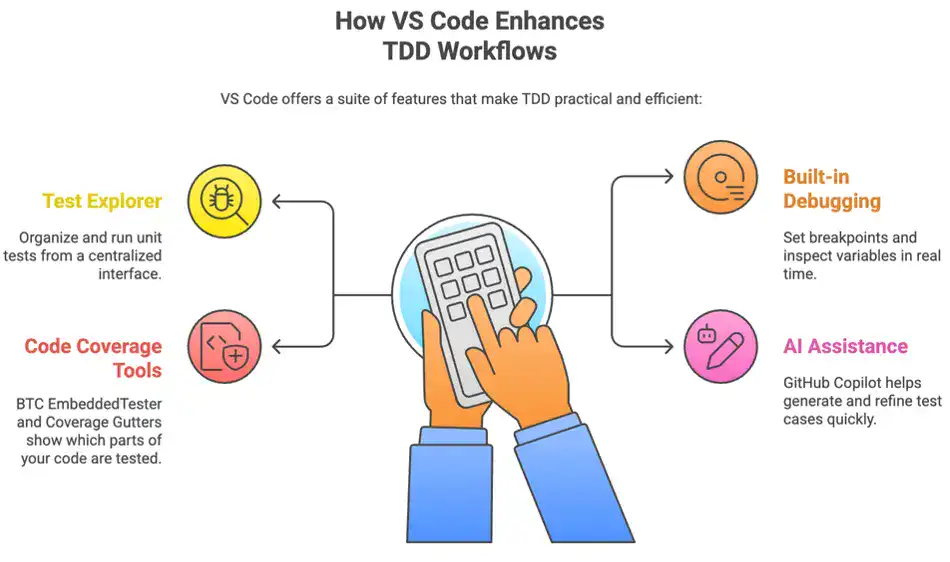From Code to Road - Choosing the Right Development Environment
The automotive industry is undergoing a seismic shift, moving from a focus on mechanical engineering to software-centric innovation. As vehicles become smarter and more connected, the complexity of their software systems increases exponentially. From autonomous driving features to infotainment and vehicle-to-everything (V2X) communication, software now drives the user experience and safety. In this fast-paced environment, choosing the right development environment is no longer a matter of convenience–it’s a strategic decision. Visual Studio Code (VS Code), a lightweight yet powerful IDE, is rapidly gaining traction among automotive developers for its flexibility, extensibility, and alignment with modern development practices.
Getting Started with VS Code for Automotive Development
Visual Studio Code is a free, open-source editor developed by Microsoft. It supports a wide range of programming languages and platforms, making it ideal for automotive software teams working across embedded systems, cloud services, and simulation environments.

Installation & Platform Setup:
- Download: Available for Windows, Linux, and macOS via code.visualstudio.com.
- Linux: Preferred in embedded and CI/CD environments.
- Windows: Common for desktop development and integration with proprietary automotive tools.
Workspace Configuration:
VS Code uses a .vscode folder to store project-specific settings. Key configuration files include:
- settings.json: Defines editor preferences and extension behavior.
- tasks.json: Automates build steps, such as compiling C/C++ code or running scripts.
- launch.json: Configures debugging sessions, including entrypoints, breakpoints and runtime arguments.
- extensions.json: Recommends extensions for the workspace to ensure consistency across teams.
These files help standardize development environments and streamline onboarding.
Best Practices:
Use remote development features like SSH or Docker to work on embedded targets or cloud-hosted environments. Leverage Git integration for version control and branching. Organize your workspace with clear folder structures and reusable configuration files. Using extensions to tailor VS Code to your specific automotive domain, whether you’re working on ADAS, infotainment, or powertrain systems, is recommended to maximize productivity and maintain consistency across teams.
How It Integrates with Automotive Toolchains and Supports Diverse Software Domains
One of VS Code’s greatest strengths is its ability to complement specialized automotive tools rather than replace them. While platforms like Simulink are essential for model-based design, VS Code enhances the development process by managing test scripts, doing C/C++ code-based development, debugging generated code, and connecting with version control systems and build tools.
Its versatility makes it suitable for a wide range of automotive domains – from infotainment and body control to powertrain and ADAS. Developers can use VS Code as a unified environment to write, test, and deploy code across multiple systems, ensuring consistency and reducing integration overhead.
This cross-domain compatibility is especially valuable in large-scale automotive projects, where software components must interact seamlessly across different ECUs and subsystems. VS Code’s modular architecture and extensibility make it an ideal hub for managing these complex interactions with different programming languages.
For instance, BTC EmbeddedTester now provides a ‘Seamless integration with VS Code’, which enables developers to execute unit tests directly within their IDE, eliminating the need to switch between environments. This integration simplifies workflows and ensures that testing remains tightly coupled with development, which is crucial for maintaining quality in fast-paced automotive projects.

Essential Extensions for Automotive Software Development
To support the full lifecycle of automotive software – from development to testing – VS Code offers a rich ecosystem of extensions. These can be grouped into three main categories:
Development Extensions
- C/C++ Extension by Microsoft: Provides IntelliSense, code navigation, and debugging support for C and C++ – the backbone of embedded automotive software. It enables real-time error detection and simplifies working with large codebases.
- CMake Tools: Automates build configuration for C/C++ projects using CMake. It supports multi-root workspaces and embedded toolchains, making it ideal for modular automotive projects.
- Docker: Allows developers to build and test software in isolated containers. This is especially useful for CI/CD pipelines and maintaining consistent environments across teams.
- Python Extension: Python is widely used in automotive for scripting, automation, and data analysis. This extension supports linting, debugging, and virtual environments, making it a versatile tool for simulation and test automation.
- GitHub Copilot: An AI-powered coding assistant that suggests code snippets and test cases. It accelerates development and helps reduce boilerplate, especially in repetitive tasks like writing unit tests or configuration scripts.
Version Control & Collaboration Tools
- Git Integration (Built-in): VS Code includes native Git support for managing repositories, branches, and commits. It simplifies version control and integrates well with GitHub, GitLab, and Bitbucket.
- GitLens: Enhances Git functionality with features like blame annotations, commit history, and repository insights. It helps teams understand code ownership and track changes over time.
- Live Share: Enables real-time collaboration between developers. Useful for pair programming, remote debugging, and code reviews – especially in distributed automotive teams.
Testing & Validation Extensions
- Google Test Adapter: Integrates the Google Test framework with VS Code. Developers can:
- Write and run unit tests for C and C++ code.
- View results in the Test Explorer.
- Debug failing tests directly in the IDE. It’s widely used for validating control algorithms and embedded logic.
- Test Explorer UI: Provides a centralized interface for managing and running tests. Compatible with multiple frameworks including Google Test and Python’s unittest.
- BTC EmbeddedTester: Tailored for automotive-grade unit testing in C/C++. It provides:
- Automotive-grade test management including requirements traceability
- Test-authoring with buit-in powerful language as well as support for GTest
- Code coverage measurement up to MC/DC coverage
- Automatic test generation with formal methods
- Equivalence classes and boundary values analysis
- Code robutness analysis including Div-by-0, Downcast, Array-Out-of-Bound analysis
- Formal Specification and Formal Verification
- Certified for ISO 26262 and ready for modern CI/CD pipelines
- TDD Integration to execute tests directly within the IDE, keeping validation tightly coupled with development.
Test-Driven Development (TDD) in VS Code
Test-Driven Development (TDD) is a methodology where developers write tests before implementing the actual code. This ensures that each function behaves as expected and promotes cleaner, more maintainable software.
In traditional automotive development cycles, testing was often reserved for the final stages before release. However, this reactive approach is no longer viable. With the adoption of agile methodologies and DevOps pipelines, automotive teams are shifting testing to the beginning of the development process strategy known as “Shift Left.” This proactive model enables earlier detection of defects, reducing the cost and complexity of resolving issues later in the cycle.

These capabilities make VS Code a practical choice for teams adopting TDD, especially in environments where reliability and maintainability are paramount.
Conclusion
As the automotive industry continues to evolve into a software-first ecosystem, the tools developers use must keep pace. Visual Studio Code is gaining momentum because it offers a compelling mix of speed, flexibility, and deep integration with agile and DevOps workflows. Its support for test-driven development, rich extension library, and compatibility with diverse automotive toolchains make it a strategic asset for modern automotive software teams.
Whether you’re debugging ECU firmware, writing unit tests for ADAS algorithms, or managing cloud-based simulations, VS Code empowers developers to reduce complexity, improve code quality, and accelerate delivery. In a world where software defines the vehicle, VS Code is proving to be the right tool for the journey ahead.
Moreover, solutions like BTC EmbeddedTester enhance this ecosystem by enabling a harmonized testing workflow across teamswithout requiring complex deployment setups or extensive configuration. This streamlined approach helps developers maintain velocity while ensuring consistency and quality across the board.



